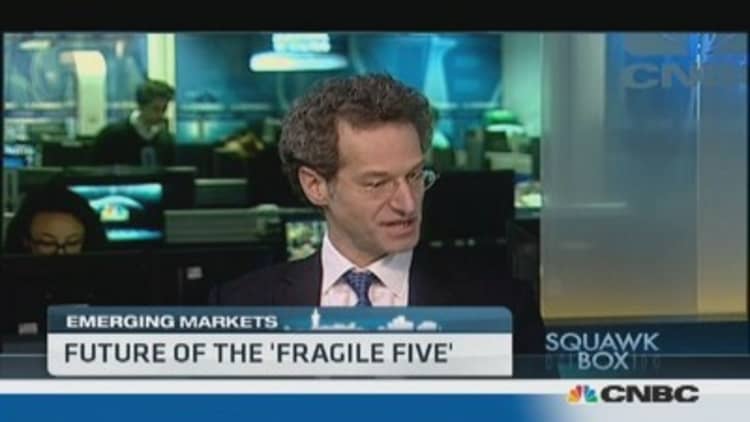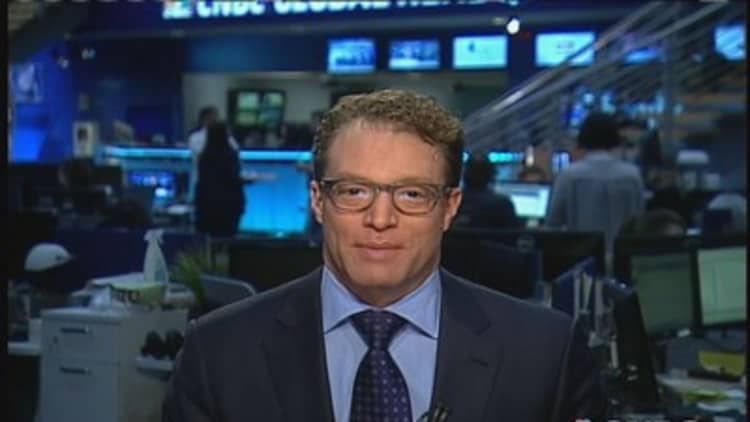The slowdown in China's economic data has been blamed on everything from the Lunar New Year holiday to structural reforms, but it may be because the economy is coming clean, Goldman Sachs said.
The twin policy drives to clean up both corruption and pollution likely explain at least part of the economic slowdown in the fourth quarter, the bank said, adding they may continue to weigh on domestic demand ahead.
(Read more: Can China's weak PMI be blamed on Chinese New Year?)
"We view these as a part of one interlinked grand strategy to change China's growth model towards a cleaner one, politically and environmentally," Goldman said in a note. "These initiatives support each other in the sense the anti-corruption (campaign) tends to make the anti-pollution campaign more effective since local officials are less likely to 'keep one eye closed' when polluters operate illegally."
But it added, "Alongside indicators of gradually decelerating activity, they suggest increasing downside risks to the growth outlook."

There can be little doubt that China's economic growth has slowed. China's gross domestic product (GDP) expanded at a rate of 7.7 percent last year, its slowest rate since 1999 and down from 7.8 percent growth in 2012. In addition, the official manufacturing purchasing managers' index fell to 50.5 in January from 51.0 in December, data released Saturday showed. It followed a decline in China's final HSBC PMI index last week to 49.5 in January from 50.5 in December, the first drop below 50 - the level that separates contraction from expansion - since August.
Contrary to expectations, the anti-corruption campaign has actually picked up strength over time, with tighter and more specific rules and more active enforcement, Goldman said, noting the number and frequency of announcements of officials being investigated for corruption or for having broken party disciplinary policies rose significantly in the second half of 2013.
(Read more: Don't bet on China's luxury spenders: Goldman)
"We also note the new leadership's commitment to investigate any instances of corruption among top level officials. This means literally no one is exempt from potential punishments, which raises the effectiveness of the campaign," it said.
While high-end consumption takes the biggest hit from the measures, other segments are also affected, Goldman said, citing moves such as a ban on using public funds to buy calendars and New Year cards. The campaign also impacts consumption and investments by households, companies and the government, it said.
Beijing's parallel campaign against pollution is also weighing on growth, particularly in regions under heavy pressure to reduce pollution, Goldman said.
(Read more: To tackle pollution, China to drop pursuit of growth at all costs)

"Anecdotally, there have been many more cases of destruction of the production plants of heavy polluters (these factories are typically also in industries viewed as having overcapacity problems, namely steel, cement and glass) whereas previously factory gates would be sealed with strips of paper, which would still leave the possibility of operating illegally," it said.
Remaining producers, which are typically larger, aren't likely to fully benefit from the reduced competition because many will now be forced to turn on the pollution-control facilities, a step they've avoided to save on costs, Goldman said.
(Read more: China's economic reforms: What you need to know)
"In the future, they will be under increasing pressure from ongoing government surveillance," it said.
To be sure, Goldman doesn't think these measures will be all bad news for growth.
"The anti-corruption campaign, together with the drive to reduce administrative controls the government has on the economy, has started to alleviate a hidden burden on corporates, which should be positive for investment over the longer term," it said.
In addition, mass consumers could see lower consumer prices as the use of public funds for consumer purchases may have helped drive up costs, it said.
—By CNBC.Com's Leslie Shaffer; Follow her on Twitter @LeslieShaffer1

